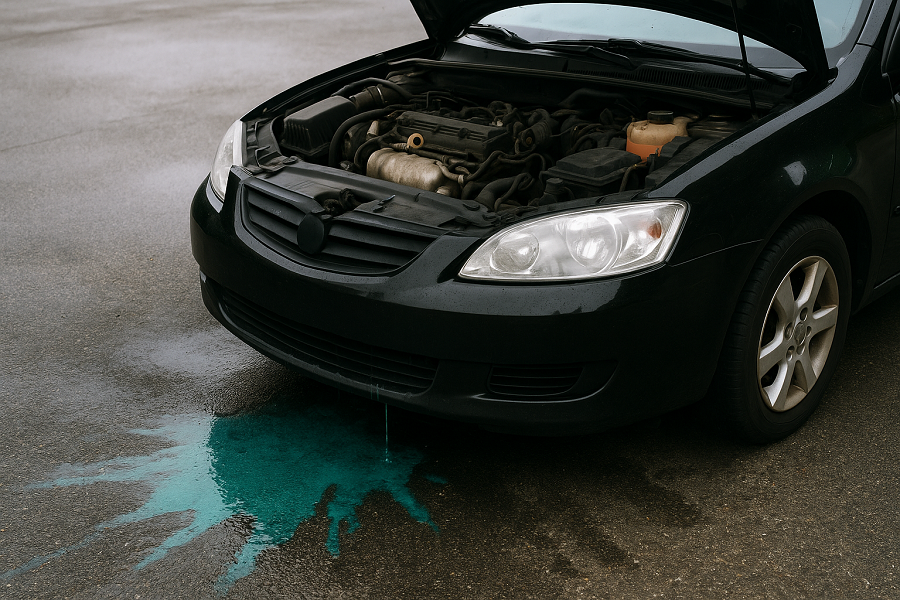1. Introduction
If you’ve noticed your Car Leaking Coolant, don’t ignore it. Coolant—also known as antifreeze—is essential for keeping your engine from overheating. A coolant leak might seem like a small issue, but it can quickly lead to major engine damage and costly repairs. From a puddle under your car to your engine overheating, these signs should never be taken lightly. In this guide, we’ll explore the common causes of coolant leaks, how to identify them, and the best ways to fix them—so you can keep your vehicle running safely and smoothly.
2. What Is Engine Coolant and Why Is It Important?
Engine coolant, or antifreeze, is a liquid that flows through your car’s cooling system to keep the engine from overheating or freezing. It absorbs heat from the engine and transfers it to the radiator, where it cools down. Without coolant, the engine would quickly overheat, leading to serious damage. Using the right type of coolant and keeping it at the proper level is key to preventing coolant leaks and ensuring your car runs efficiently.
3. Common Signs Your Car Is Leaking Coolant
Not sure if you’re dealing with a coolant leak? Look out for these symptoms:
- Puddle under your car: Usually green, orange, or pink in color.
- Low coolant warning light on the dashboard.
- Engine overheating, especially during long drives.
- A sweet smell from the engine bay.
- White smoke from the exhaust pipe.
- The heater not working as it should.
These coolant leak symptoms often show up before things get worse, so it’s important to catch them early.
4. Major Causes of Coolant Leaks
Several components can cause your car to leak coolant:
- Cracked radiator or damaged radiator cap
- Worn-out hoses or loose clamps
- Water pump failure
- Coolant reservoir cracks
- A blown head gasket leak
- Heater core damage
Identifying where the leak is coming from can save you from bigger issues like a cracked engine block or costly repairs.
5. How to Diagnose a Coolant Leak
To spot the leak, start with these steps:
- Visual inspection: Check under the car and around the engine bay.
- Coolant pressure test: Pressurizes the system to expose hidden leaks.
- UV dye detection: Add dye to coolant, then use a UV light.
- Monitor coolant level: Refill and see if it drops quickly again.
These tests help you detect both minor and major engine coolant leaks before they escalate.

6. Immediate Actions to Take If You Notice a Leak
When you see signs of a coolant leak, act quickly:
- Check coolant level and top off if necessary.
- Avoid driving if the engine is overheating.
- Use a coolant sealant for a temporary fix.
- Pull over if you see white smoke or a rising temp gauge.
- Call for roadside assistance if needed.
Delaying action can cause severe engine damage or even failure.
7. How to Fix a Coolant Leak: Step-by-Step Guide
Depending on the cause, you may be able to fix it yourself:
- Identify the source of the leak (hose, radiator, pump, etc.)
- Replace damaged parts like a cracked hose or worn-out clamp.
- Use sealant only for very small leaks as a temporary solution.
- Flush the cooling system if coolant is contaminated.
- Refill with correct coolant type and bleed out air pockets.
Always wear safety gear and allow the engine to cool before working.
8. Coolant Leak Repair Costs: What to Expect
Repair costs vary depending on the issue:
- Radiator replacement: $300–$900
- Water pump: $250–$700
- Hoses or clamps: $100–$200
- Head gasket leak: $1,000–$2,000+
- Coolant pressure test: $50–$100
Early detection and quick fixes can save you hundreds or even thousands of dollars.
9. How to Prevent Coolant Leaks in the Future
Prevention is better than expensive repairs:
- Inspect coolant hoses regularly for wear or bulges.
- Replace parts with OEM components.
- Flush the cooling system as recommended (usually every 2–5 years).
- Use the correct coolant type (check your owner’s manual).
- Watch for coolant leak warning lights or odd smells.
Routine maintenance helps avoid leaks and keeps your car in good health.
10. Frequently Asked Questions (FAQs)
Can I drive with a coolant leak?
Only if the leak is minor and the engine isn’t overheating—but it’s risky.
Is a coolant leak dangerous?
Yes. It can cause engine overheating, misfires, or complete engine failure.
Can I use water instead of coolant?
Only as a temporary solution. Coolant contains important additives that water doesn’t.
What color is leaking coolant?
It’s usually green, pink, orange, or yellow depending on the type.
Can coolant leaks cause white smoke?
Yes, especially if there’s a head gasket leak allowing coolant into the combustion chamber.
11. Final Thoughts and Pro Tips
A car leaking coolant isn’t just an inconvenience—it’s a potential engine killer. Don’t wait for overheating or dashboard warnings to act. Regular inspections, proper coolant maintenance, and using high-quality parts can go a long way in preventing future leaks. And remember, if you’re unsure, it’s always best to consult a trusted mechanic to avoid costly repairs later.


